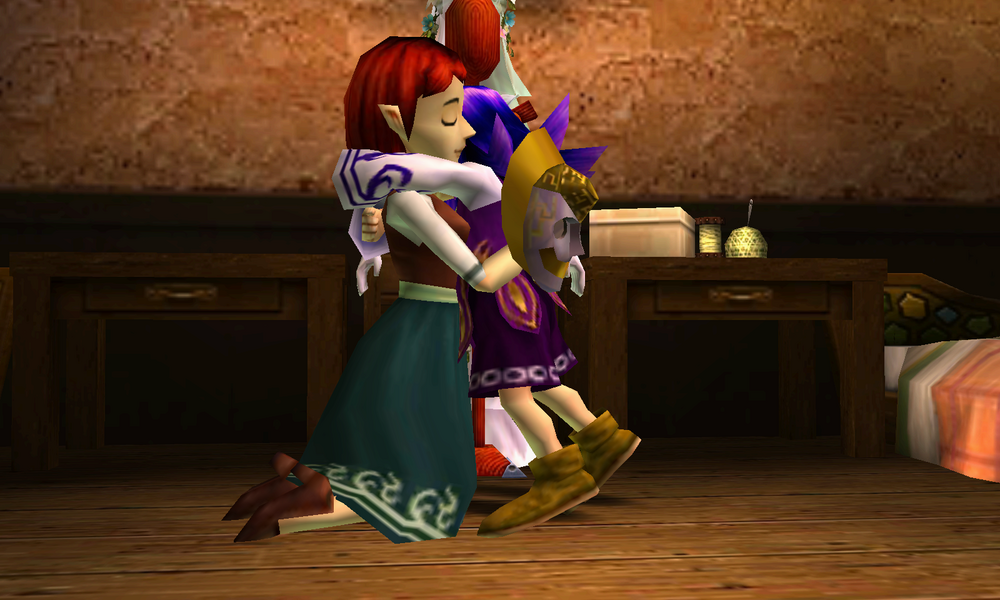A classic time loop scenario, in my experience, is that of some kind of world-ending or apocalyptic event happening, over and over. In Majora’s Mask, it’s the moon crashing into Termina, in Outer Wilds, it’s the sun exploding, in Edge of Tomorrow, it’s a catastrophic alien invasion, and in countless other stories it’s a kind of smaller-scale end of the world: your own death, or that of a loved one, etc. etc. The obvious answer to why this is the case could pretty easily be traced to the human instinct of thinking that if you could just, somehow, change a few little things from the past, that you could avoid some tragedy entirely. But I also wanted to write a small post about an aspect of time loops we alluded to in class: time loops as a metaphor for societal malaise, of feeling like nothing ever changes.
This would obviously take a bit more than a blog post to explore, but I think it’s interesting to look at the prevalence of, say, more traditional time travel movies from the 60’s to the 90’s, and compare them to the increasing prevalence of time-loops or more experimental time travel films of today. It’s hard to deny that almost all time travel movies are about the pitfalls of time travel, but it’s also hard to deny the tonal difference between a movie like Back to the Future and Tenet, or a game like Prince of Persia: Sands of Time and Outer Wilds. It’s also interesting to compare “western” and, say, Japanese media, in this sense. This was also alluded to in class, but it seems like time loop content became much more prominent much earlier in Japan than in the US. Majora’s Mask comes out in the 90’s, All You Need is Kill, the light novel that forms the basis of Edge of Tomorrow, comes out in 2004, etc. It feels like you can almost trace the waxing and waning optimism of each country. Majora’s Mask, in particular, contains countless allusions to some “good old days” in the past, with many of the masks being failed disgraced musicians, warriors, etc.
I don’t have any particular defined conclusions on this, but it’d be interesting to look and see if there’s any way to turn these more anecdotal observations on time-travel/sci-fi trends into something more concrete–have time loop games really had upticks in these times of societal malaise, or am I just imagining that? Regardless, I believe that there’s absolutely a whole lot of sociopolitical commentary to be read into games about repeating the same things over, and over, and over again.


These are really interesting questions! I never would have connected time-loops with societal optimism, but I think there could be some merit to the idea. Another thing that I was thinking about in relation to these ideas is that many time-loops in media seem to end with some act of martyrdom. I haven’t played Majora’s Mask but AYNIK/Edge of Tomorrow seems to reflect profound sacrifice in exchange for change. I’m not sure how exactly this connects to societal malaise, but it might reflect how deeply entrenched people believe their conditions to be.
I think you brought up some really interesting questions. I thought your final point about constant repetition was particularly fruitful. It makes me wonder what differentiates potentially calming repetition from hopeless repetition. Repetition is a common facet on non-time loop video games, such as Stardew Valley or Animal Crossing: New Horizons. Obviously, the degree of repetition is not the same, but both games still involve high degrees of repetition including repeated dialogue and scenarios. What makes these forms of repetition different, and what does the popularity of such peaceful yet repetitive games say about our current social state?
I’ve been thinking about this question too! I’ve found it interesting that time loops have become popular in the ever-progressing information age, where things seem to change so fast that it’s tempting to say that nothing really does anymore. This is anecdotal, but I believe there was an idea (particularly in America) about the 1990s constituting the beginning of the “end of history,” with the USSR having fallen and world-scale war being largely abated. We know that obviously to be false now, but maybe it was a unique facet of the 1990s-2010s as a historical era that made time loops feel more intriguing as a concept to gamers and movie-watchers.
I can’t find this interview about Majora’s Mask that I read once for a research project, but I’m fairly certain that there was a story somewhere in one about how the game was written concurrently with a nuclear bomb scare in Japan from North Korea, and that the developers were all at one of their coworker’s wedding when a bomb siren went off. It’d be hard to imagine that an atmosphere like that didn’t affect the game somehow, even if the original idea for the looping time came out of a need to finish development of the game in about a year.